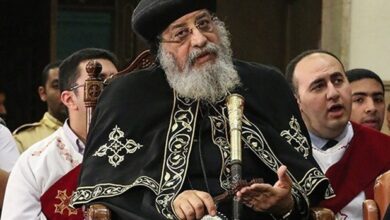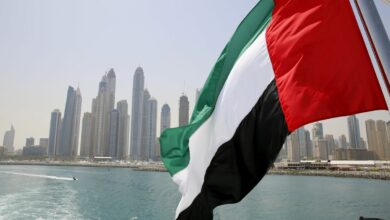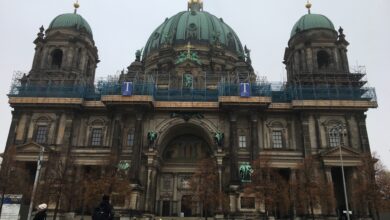On the walls of Samir Mounir’s reception hang some of the icons of his faith. “My uncle used to hang a picture of [national leader] Saad Zaghloul in his reception,” Mounir says, lamenting the death of politics in average Egyptian families today. “The government does not encourage political work and has applied its pressure everywhere, especially in universities.” He has just retired from his job at the Ministry of Electricity and he is now focused on raising his 20-year-old daughter.
For Mounir and many other Copts, the church now fills a persisting political void. But this role has grown within a larger socio-political context that goes back in time to the turn of the century.
“The church is our political and religious leader and its rule bears us better fruit,” Mounir states. “The church brings us together and does not desire much association [with non-Christians]. Our Pope works in the spirit of avoiding problems, because a clash will have negative repercussions,” he says. Mounir does not encourage his daughter to join any political movement at her university.
For many Christians, marginalization is the reason why they shy away from politics, believes Mounir. “Our sense of belonging is not the same anymore, mainly due to a growing mistrust in the government. There is a feeling of deliberate marginalization, of discrimination. We feel estranged, like guests in our own country.” He cites examples of Christians not reaching managerial positions in government establishments despite their ability and qualifications, the lack of a law that regulates an equal right to build religious premises, and most importantly, the fact that Christians are not promoted in the political sphere by the political elites.
“The simple fact of how accurately our numbers have been announced is a source of mistrust. How many of us are there? Are we a quarter of the Egyptian population? Or a little less? Or far less? We don’t know.” Official figures in 2008 estimated the number of Christians in Egypt as reaching 10 percent of the overall population.
George Ishaq, political activist and former coordinator of Kefaya, a loose coalition of opposition movements and individuals, represents an exception to the contemporary Coptic prototype. He vividly recalls, from back in the late 1970s when he worked as a school headmaster, a speech made by late president Anwar Sadat. “When he said he was a ‘Muslim president for the Muslim people,’ I looked at the faces of my Christian colleagues and recognized a feeling of loss and confusion, as if they wanted to ask, ‘and what about us?’” When most people in Ishaq’s Christian community at that time turned to the church to seek alternative leadership, he decided to keep his allegiance to the church tied to religious matters only.
To the Coptic church, Ishaq seems to be less than the desired model of loyalty. When he was arrested in April 2008 on allegations of mobilizing people to protest against the government, the church issued some unsympathetic statements. “The Pope declared in a statement that I was ‘not the son of the church.’ A church spokesman wrote in a newspaper that I had not been seen going to church and that’s why the church would not defend me,” Ishaq recalls.
Ishaq believes Copts should engage more in political life: “Throughout my political career, I have never been made to feel that I am different because I am Christian, even when dealing with representatives of the Islamic movements. Copts should enter the political sphere because this is what will settle pending clashes.”
"Pending clashes" go back to the end of the 1940s, according to Nabil Abdel Fattah, a political commentator with Al-Ahram Center for Political and Strategic Studies and author of The Politics of Religion. Back then there were two main trajectories for Christian middle classes: either joining the church, which was the path chosen by Pope Shenouda himself, or joining underground leftist movements.
“By the time of the 1952 revolution there were almost no Christians among the ranks of the organizers of the coup. The government then resorted to the church to represent it before Christians,” says Abdel Fattah. Meanwhile, the conflict between the Muslim Brotherhood and subsequent Egyptian regimes following the 1952 revolution reinforced the position of religion in politics. “This scared many Christians and made them step away from the political arena,” Fattah says.
Mina Zekri, a medic and human rights activist, frames the 1952 takeover as a landmark in the map of Coptic de-politicization. “The July 1952 movement and the nationalist forces behind it put an end to the Egyptian liberal current which started at the beginning of the 20th century and which provided a context for a social renaissance.” Such a context included such features as the promotion of women’s rights, governments limited by parliaments, power-sharing, and political mobility, all alongside Copts’ participation in politics. “[Late President Gamal] Abdel Nasser used religious institutions to gain popularity and that grew the seeds of factionalism,” says Zekri. When Pope Kirolos was head of the Coptic church he endorsed the patriarchal state model that was the offspring of the 1952 legacy and was on good terms with Nasser.
Sadat’s rule consolidated the process of Copt’s distancing from political spheres in many ways, according to Zekri. For one, Sadat initially endorsed militant Islamic groups as the spearhead of this battle against communist groups and influence. Then there was the landmark constitutional amendment in 1980, when a provision for shari’a to become the source of all legislation was drafted.
Pope Shenouda III, who assumed his post in 1971 as patriarch of the Coptic church, has widely been known as “a man with a conservative social vision. He favors the church’s authority over the life of Christians in all aspects,” according to Fattah. Shenouda’s vocal support for Copts’ rights cost him punishment by Sadat, who deposed him in 1981.
This tension was resolved during President Hosni Mubarak’s term; the latter released Pope Shenouda from exile in 1985. “The current church’s overt support for the regime reflects a balance: the church gains authority over the lives of Christians and in return it guarantees their loyalty to the regime,” says Zekri. Pope Shenouda made a television statement in October 2009, in which he said he would endorse Gamal Mubarak, the president’s son, in a potential bid for the presidency. A life-size picture of the young would-be president of Egypt was seen at an official iftar (fast-breaking) ceremony held at the Coptic cathedral in Abbassiya during Ramadan 2009.
The Coptic church has developed as an alternative society for Christians. Today the church is more than just a Sunday service: it’s a social club, a learning center, and a medical care center among others. The Virgin Mary Coptic Church, in the Ain Shams district, east of Cairo, is a case in point. The reception area at the ground level of the church is teeming with people. “We have been doing lots of activities for different segments of the community. For example, we recently began organizing a gathering for the workers of the district. In one day, we can have up to four gatherings of different groups of people.”
The church is central to the area’s large Christian community. In late 2008, it was the site of skirmishes when a riot erupted in front of an extension building to the church, provoked by the development of a house of prayer for the Christians. The protesting crowd started throwing stones at the church while a group of young people were praying inside, and the riot quickly escalated into violence that lasted for a few hours.
“We encourage people to come to church and they find everything here. For example, a psychologist can spend years trying to treat a patient, but the faithful can just come and do the act of confession at the church and they will be both healed and forgiven,” adds Father Youhanna. He argues that with the seven sacraments of the church, the institution has all the tools to organize the daily life of Christians from the day they are born to the day they die. A sacrament is a sacred act or ceremony in Christianity, the materialization of divine concepts to the faithful, administered by clergy. Most churches recognize a set of sacraments that include baptism, confession and matrimony.
As for politics, Father Youhanna speaks of a “positive political role [that] has to be played by Christians under the commands of the Holy Pope.” Before rushing to join the choir group, he adds, “Christians need to see the government fulfilling their trust in them.” As we walk out of the church, the hymns in the background are the last we hear.




